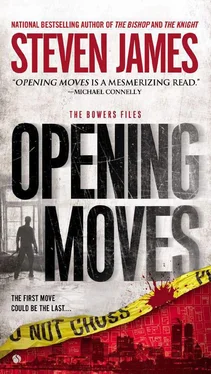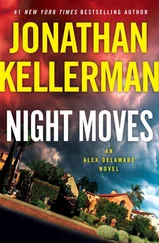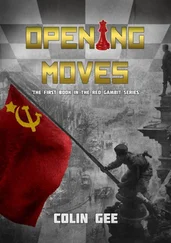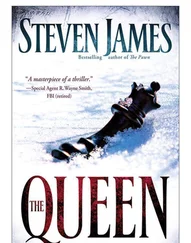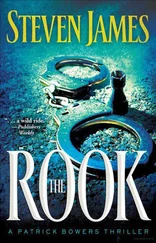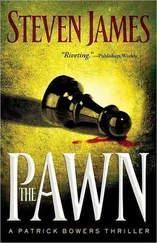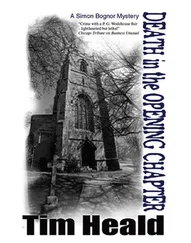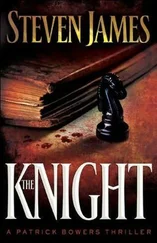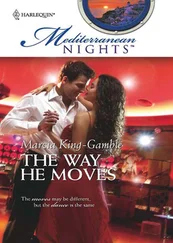Steven James - Opening Moves
Здесь есть возможность читать онлайн «Steven James - Opening Moves» весь текст электронной книги совершенно бесплатно (целиком полную версию без сокращений). В некоторых случаях можно слушать аудио, скачать через торрент в формате fb2 и присутствует краткое содержание. Жанр: Полицейский детектив, на английском языке. Описание произведения, (предисловие) а так же отзывы посетителей доступны на портале библиотеки ЛибКат.
- Название:Opening Moves
- Автор:
- Жанр:
- Год:неизвестен
- ISBN:нет данных
- Рейтинг книги:4 / 5. Голосов: 1
-
Избранное:Добавить в избранное
- Отзывы:
-
Ваша оценка:
- 80
- 1
- 2
- 3
- 4
- 5
Opening Moves: краткое содержание, описание и аннотация
Предлагаем к чтению аннотацию, описание, краткое содержание или предисловие (зависит от того, что написал сам автор книги «Opening Moves»). Если вы не нашли необходимую информацию о книге — напишите в комментариях, мы постараемся отыскать её.
Opening Moves — читать онлайн бесплатно полную книгу (весь текст) целиком
Ниже представлен текст книги, разбитый по страницам. Система сохранения места последней прочитанной страницы, позволяет с удобством читать онлайн бесплатно книгу «Opening Moves», без необходимости каждый раз заново искать на чём Вы остановились. Поставьте закладку, и сможете в любой момент перейти на страницу, на которой закончили чтение.
Интервал:
Закладка:
Just before coming into the house, he’d heard through the police scanner that law enforcement had made the connection to Carl Kowalski, which explained why he hadn’t called at five-he was in custody. But at least he’d done as asked and Miriam Flandry’s skinned corpse had been found. The media would undoubtedly be jumping all over the story tonight.
Joshua put his gun away.
And of course, when law enforcement made the connection to Carl, they’d also discovered that the woman who’d been found in the train yards, the woman who was missing a finger, was Carl’s fiancee, Adele Westin.
But.
They’d also found Bruce Hendrich. He was the part-time security guard whose hours Joshua had researched so thoroughly, been so careful to avoid whenever he entered the train yard. And now he was found dead there. Stabbed. Locked in another boxcar.
Why then? Why there?
From Hendrich’s schedule, Joshua knew he hadn’t been on the docket to work today.
Questions chasing him, Joshua returned to the kitchen and helped Sylvia set the table.
“Did you have a good afternoon?” she asked him.
“Yes.” He tried to concentrate on her, to not let the events of the day come between them. “How did the house showings go?”
“Didn’t sell any, but you know what they say…” She smiled, but Joshua could see that it was a bit forced, that she wasn’t exactly optimistic but was trying hard to be. “Just live it through.”
“That’s right,” he said. “Just live it through. It’ll all work out. You’re good at what you do.”
A welcome smile. “Thank you, dear.”
He looked over the meat loaf, baked potatoes, and carrots she’d prepared. “Supper looks great.”
A pause. “Where were you all day?” she asked. “I tried calling.”
“Running errands. Taking care of a few things.”
After they’d said grace and started eating, his thoughts wandered back to the train yard.
Was it possible that it was all a coincidence?
Possible, perhaps, but how likely was that?
There was only one other explanation.
Someone knew. Someone knew he was going to be in the yard, knew he was going to have a woman there tonight.
It was unfathomable to think that, but Joshua let himself think it anyway. Because he had to.
And if that was the case, if someone knew, that might explain why law enforcement showed up when they did-the person could have contacted them, called in a tip.
But then why leave Hendrich dead? And locked in a train car?
Someone out there is trying to set you up, trying to frame you for Hendrich’s murder.
But why?
As Sylvia ate, she told Joshua all about her day and he listened, not just because it was something a good husband should do, but because he was genuinely interested in her life. But despite that, admittedly, his attention did drift at times to what had happened tonight, to what was going to happen in the next two days.
Tonight he would watch the news, find out what he could about how it might have been that Hendrich happened to show up dead when he did at the train yard. It was important to make sure everything was set for Wednesday, for what was going to happen with the cop, so tomorrow, he would return briefly to look over the best places to park near the bank on Highway 83 in Wales-the same bank the Oswalds held up the day they were arrested.
The scripture verse was not just true for him, it would be true for the cop as well: “The good that I would I do not: but the evil which I would not, that I do.”
That.
I.
Do.
Yes, the officer he had in mind would find out the true meaning of those words.
47
Two years ago the Maneater of the Midwest began to call himself, in his own mind, what he truly was.
A ghoul.
Of course he’d heard of ghouls before that. He knew what they were, that they liked to consume human corpses, often those dug up from graveyards, but the day when he finally began to think of himself in terms of being one, of placing himself in that category, was freeing and, in a way, like coming home.
When you’re this way, you can’t help but want to find someone else like you. It’s inevitable. So, over the years he’d always hoped to meet another actual ghoul. Curiosity mostly-though he hadn’t been sure how he would respond if he truly found one. He had not always worked alone, but he had not yet found anyone else who shared his particular interests.
However, there were a few times when he had met people who gave off hints that perhaps, yes, just perhaps, they would understand, so those were the times when he’d tested the waters, put out feelers, so to speak, to see if he’d found a kindred spirit.
After a few beers, or on a long car ride, or during a period of marijuana-induced honesty, he would say something like, “Did you ever wonder about those soccer players back in the seventies? Up in the Andes Mountains? Remember hearing about that?” And maybe his friend would say yes she had, or maybe she would give him a blank look and shake her head no.
“Yeah,” he would say, “when their plane crashed. Twenty-nine out of the forty-five survived. The mountain was isolated, snow-covered. The survivors had nothing to eat and when some of them started dying, they knew they needed to find something fast. They were all starving.”
And at that point he would pause and study the face of the person he was talking to, study it to see if she was able to jump ahead to the inevitable conclusion.
Finally, it would come. “You don’t mean they…that they ate each other?”
“Well, only the dead ones,” he might joke, depending on the situation. In either case, it was a critical point, the telling moment. “Yes, they had to,” he would say. “If they were going to survive.”
And here came the reaction that would either end the conversation for good, or give him hope that perhaps he’d finally found someone who could understand.
Usually, the reaction was the same: “Ew. That’s horrible!” or “That’s disgusting” or “I’d rather die myself! I would never do that!” or the like, and what could he do? The Maneater wasn’t the type of person to argue. So he would agree with her about how unthinkable such a thing was. “You’re right. It’s disgusting. I can’t imagine how civilized people could ever do that.”
He would say things like that, and then take a long draft of beer or a drag of his joint and never bring up the subject to that person again.
However, there was one woman he’d met who seemed to contemplate the situation a little more clearheadedly. They’d gone out for supper and were walking through downtown Milwaukee when he’d brought up the question. She’d thought about it and said, “The thing is, those guys had to survive, right? I mean, why should all of them die when some of them could live? Why, when there was fresh meat lying there preserved for them in the snow? Should they starve to death, just because of a social stigma, the cultural conventions of Western society?”
“Good point.” He decided to step out on a limb. “In some cultures it’s perfectly acceptable to eat other people. Cannibalism isn’t frowned on in other places as much as it is in America, or, say, Britain. There was a group of Indians who ate their parents’ dead bodies.”
“As a show of respect,” she said. “Yes, I’ve heard of that.”
He stopped walking. Took her hand. “You have?”
“We studied it in this anthropology class I had last year. Herodotus, right? He wrote about it?”
“I guess. I don’t know; I’m not sure.” But it wasn’t a guess and he did know. For sure.
He was nervous to ask the next question, but he had to find out the answer. “And what did you think of that? When you heard about it?”
Читать дальшеИнтервал:
Закладка:
Похожие книги на «Opening Moves»
Представляем Вашему вниманию похожие книги на «Opening Moves» списком для выбора. Мы отобрали схожую по названию и смыслу литературу в надежде предоставить читателям больше вариантов отыскать новые, интересные, ещё непрочитанные произведения.
Обсуждение, отзывы о книге «Opening Moves» и просто собственные мнения читателей. Оставьте ваши комментарии, напишите, что Вы думаете о произведении, его смысле или главных героях. Укажите что конкретно понравилось, а что нет, и почему Вы так считаете.
